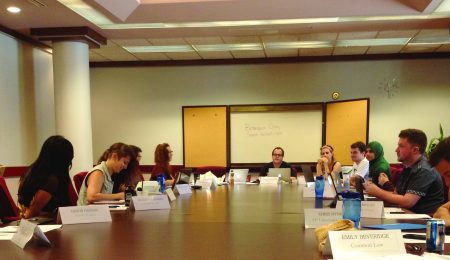Next Stop
COMMERCIALS, TV SHOWS, lectures, movies, news, the latest gossip—in a day, we’re faced with countless messages, all of them demanding our immediate attention.
We’re forced to pick and choose in order of importance, often forced to do, discuss, or remember something less urgent at a later time. Post-it notes and agendas are living proof we can’t hold everything in our brain at once. Is this where apathy is born?
After every election, voter turnout numbers come in, and as youth we get yelled at for not caring enough, not voting enough, and generally not being all that active. But are we just forgetting that we’re supposed to do something important?
Some scientists think so. Research ominously dubbed “Your brain on Google,” carried out by the University of California, found those who frequently use the Internet tend to have a great short-term memory, but their long-term memory sucks.
We are the Google, Facebook, and Twitter generation. We’re constantly surrounded by technology, often unwilling to unplug. And, in my opinion, it’s why so many of us are apathetic, or oblivious, to things we consider secondary—for example, politics.
I think for many people, like the 50.8 per cent of those eligible who didn’t vote in the Ontario election, staying up-to-date with current affairs is not a priority. I can’t say I blame them; between classes, work, and a social life, finding time to pick up and read a newspaper can be challenging.
I think keeping up-to-date is something we should strive for. I’m not going to preach being involved, voting, or reading the news section of your favourite newspaper cover to cover. What the less informed of us need to realize is the usefulness of keeping up with current affairs in your field.
Knowing what’s going on means being able to incorporate that awareness into essays, job interviews, and everyday conversations with people who may prove useful later in life. Setting time aside to catch up is an easy way to appear more educated and not be caught off guard when asked about an issue.
Really, are your friends’ status updates a higher learning priority than, for example, keeping up with the election results or a political movement? They shouldn’t be.
—Jane Lytvynenko
news@thefulcrum.ca
(613) 562-5260




